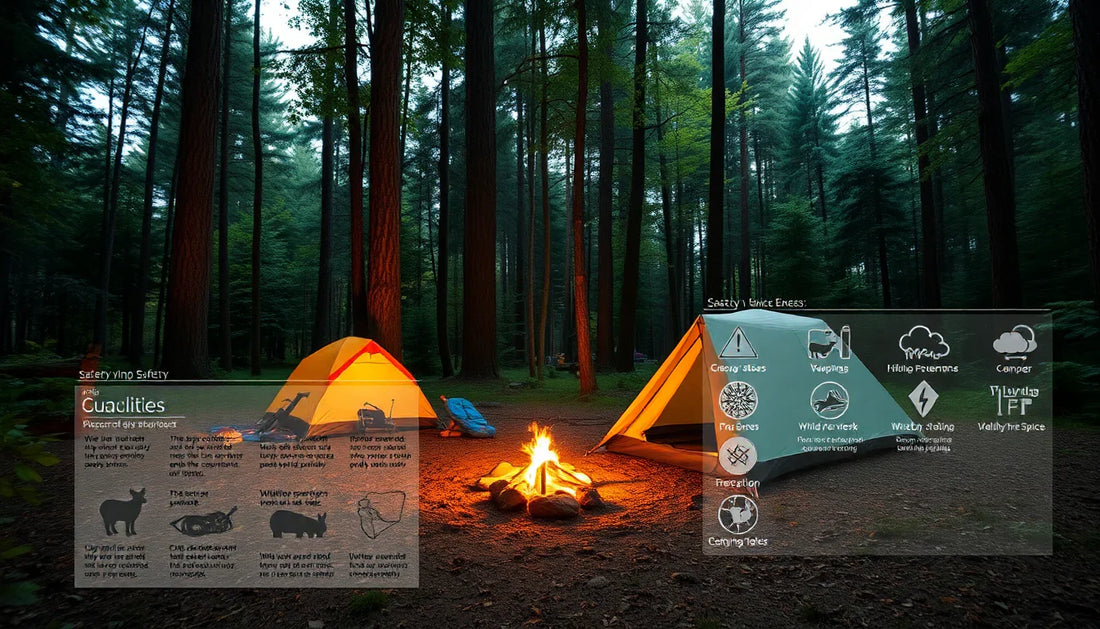
How to Stay Safe While Camping: Tips for Wildlife, Weather, and More
Share
Camping is an exhilarating way to connect with nature and enjoy the great outdoors. However, it's crucial to prioritize safety when venturing into the wilderness. From navigating unpredictable weather to encountering wildlife, there are numerous factors to consider to ensure a secure and enjoyable camping experience. In this comprehensive guide, we'll explore essential tips and strategies to help you stay safe while camping, covering everything from wildlife encounters to campfire and cooking safety.
Wildlife Safety
One of the primary concerns when camping is the potential for wildlife encounters. Different regions and ecosystems harbor a diverse array of animals, each with their own unique behaviors and potential risks. Before embarking on your camping trip, familiarize yourself with the local wildlife and their typical habits.
Proper food storage is crucial to avoid attracting unwanted animal visitors to your campsite. Always keep food, toiletries, and any scented items securely stored in bear-proof containers or hung high in trees, away from your tent. Avoid cooking or eating near your sleeping area, and be sure to clean up any spills or crumbs promptly.
When it comes to encountering wildlife, it's essential to maintain a safe distance and avoid approaching or feeding the animals. If you come across a bear, for example, remain calm, speak in a low, steady voice, and slowly back away while facing the animal. In bear country, be extra vigilant and consider carrying bear spray as an additional precaution.
Weather Safety
Unpredictable weather can pose significant risks to campers, so it's crucial to stay informed and prepared. Before your trip, check the forecast and be aware of any potential severe weather conditions, such as thunderstorms, high winds, or heavy rain.
Ensure that you have the appropriate gear to handle various weather scenarios. Pack weatherproof clothing, sturdy rain gear, and a reliable shelter that can withstand the elements. If you encounter unexpected weather, seek immediate shelter and avoid being caught in the open during dangerous conditions.
Be mindful of the signs of extreme weather, such as rapidly changing skies, sudden temperature drops, or the sound of approaching storms. If you notice these indicators, take immediate action to secure your campsite and seek a safe location.
Campsite Selection and Setup
Choosing the right campsite can make a significant difference in your overall safety and comfort. Avoid setting up camp in low-lying areas or near bodies of water, as these locations may be prone to flooding or other weather-related hazards. Instead, opt for higher ground with good drainage and natural wind breaks.
When pitching your tent, be mindful of its placement. Ensure that it's a safe distance from any potential hazards, such as overhanging branches, steep slopes, or areas with loose rocks or debris. Properly secure your tent to the ground to prevent it from being blown away in strong winds.
Personal Safety Precautions
Maintaining personal safety while camping is essential. Ensure that you have a well-stocked first aid kit and the knowledge to handle minor injuries or emergencies. Pack essential survival items, such as a compass, flashlight, and emergency whistle, to aid in navigation and signaling for help if needed.
Familiarize yourself with basic survival skills, such as fire-starting techniques and shelter-building, in case you find yourself in a challenging situation. Additionally, be mindful of your surroundings, especially during nighttime, and consider carrying a personal safety device, such as a personal locator beacon or satellite communicator.
Campfire and Cooking Safety
Campfires and outdoor cooking are integral parts of the camping experience, but they also come with inherent risks. Always follow local regulations and guidelines when building a fire, and choose a designated fire pit or ring that is clear of any flammable materials.
When cooking, be cautious of hot surfaces and open flames. Maintain a safe distance from the fire, and never leave your cooking unattended. Properly extinguish the fire when you're done, ensuring that all embers are completely out before leaving the area.
Emergency Preparedness
Despite your best efforts, unexpected emergencies can still occur while camping. Ensure that you have a plan in place for responding to various scenarios, such as injuries, severe weather, or wildlife encounters.
Pack a comprehensive emergency kit that includes first aid supplies, emergency communication devices, and essential survival gear. Familiarize yourself with basic first aid techniques and be prepared to provide immediate care in the event of an accident or injury.
Additionally, make sure to inform friends or family members of your camping itinerary and check-in with them regularly. This can greatly improve your chances of receiving timely assistance in the event of an emergency.
Conclusion
Camping can be an incredibly rewarding and enjoyable experience, but it's essential to prioritize safety throughout your outdoor adventure. By following the tips and strategies outlined in this guide, you can minimize the risks and ensure a secure and memorable camping trip.
Remember, being prepared and staying vigilant are the keys to a safe and successful camping experience. Embrace the great outdoors with confidence, and let your love of nature guide you on your next camping adventure.
